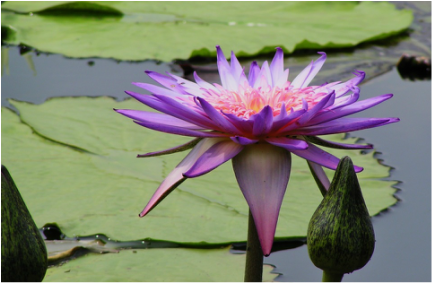The words Mindfulness Meditation might sound overwhelming and mysterious. Don't be scared. It's really a very simple concept and anyone can begin whenever they want to try.
The act of being mindful simply means being aware of the moment you are in, unencumbered by past and future thought, and free from judgement. When we choose to be mindful we are simply choosing to be, without praise or blame. Just be. It might be a little tricky settling your mind, but keep at it. It's well worth the effort. Most of us have very busy minds directed by inner critics who are very adept at criticizing, mocking, and undermining this sort of effort - any effort, actually, that represents something new. Don't worry about it. That's just your ego telling you it's afraid you won't need it anymore. Poor ego. Be kind to it, but you can tell that voice that you are working on something very important right now and you'll check in with it later. That's what I do, anyway. It seems the more kindness I show my ego, the less vulnerable I am to its tantrums.
Meditation is pretty clearly defined as "to spend time in quiet thought for religious purposes or relaxation." You can check The Merriam Webster Dictionary to see that and the many other variations on the word meditation, but it pretty much boils down to this: spending time in quiet thought. [1]
Put them together and you get Mindfulness Meditation: Spending time in quiet thought with a focus on the present moment. Not the kind of thought that has you evaluating the quality of your breath, wondering how you look while meditating, hoping no one walks in on you, mentally preparing a shopping list, or telling yourself to call your son and remind him to feed the dog. Quiet thoughts, such as noticing with gratitude the surface that is holding you up, recognizing your own breath as it enters your nostrils, feeling cool air hit the back of your throat, noticing your belly rise and fall, and feeling the breath leave your body.
Research conducted at The University of Arizona reported 5 very specific health benefits that can come as a result of Mindfulness Training. It can strengthen the immune system, improve relationships (familial as well as with strangers), reduce anxiety and stress while increasing happiness, increase openness to new experiences while decreasing neurotic feelings, and it can lead to a clearer, more flexible and practical view of reality. Read more here: Mindfulness Training Has Positive Health Benefits. [2]
Where to begin?
We are often told to begin with the breath in Mindfulness Training. This simply means that we focus our attention on the movements and sensations associated with breathing. This focused attention on the breath might be hard to do at first, especially if your mind is very busy. That's okay. Almost everyone has trouble learning how to quiet the chatter in their minds and simply be with the breath.
To get you started I'm sharing a few very simple exercises (you know how I love to share great resources that cross my path). Here are four strategies you can practice, shared from The Guided Meditation Website. I'll list the exercises here and you can go to the article, Mindfulness Exercises, for more details and instructions.[3] Notice your reaction as you read each one:
Did any of the exercises feel particularly appealing or inviting? I would suggest starting there because I always think of this as a wee nod from my intuition. If not, start anywhere. The most important thing you can do in developing a mindfulness routine, or practice, is to begin.
Some people find it easier to relax their very busy minds when they have something to listen to. Here's a YouTube clip of mindfulness bells, also from The Guided Mediation Website, which may help you develop your own mindfulness practice.[4] If you like this you might want to acquire a full audio collection, for sale on the page. Spend some time on the page, too. There are lots of great resources there.
Take a few deep breaths from way down in your belly, click the play button, and take five for you.
The act of being mindful simply means being aware of the moment you are in, unencumbered by past and future thought, and free from judgement. When we choose to be mindful we are simply choosing to be, without praise or blame. Just be. It might be a little tricky settling your mind, but keep at it. It's well worth the effort. Most of us have very busy minds directed by inner critics who are very adept at criticizing, mocking, and undermining this sort of effort - any effort, actually, that represents something new. Don't worry about it. That's just your ego telling you it's afraid you won't need it anymore. Poor ego. Be kind to it, but you can tell that voice that you are working on something very important right now and you'll check in with it later. That's what I do, anyway. It seems the more kindness I show my ego, the less vulnerable I am to its tantrums.
Meditation is pretty clearly defined as "to spend time in quiet thought for religious purposes or relaxation." You can check The Merriam Webster Dictionary to see that and the many other variations on the word meditation, but it pretty much boils down to this: spending time in quiet thought. [1]
Put them together and you get Mindfulness Meditation: Spending time in quiet thought with a focus on the present moment. Not the kind of thought that has you evaluating the quality of your breath, wondering how you look while meditating, hoping no one walks in on you, mentally preparing a shopping list, or telling yourself to call your son and remind him to feed the dog. Quiet thoughts, such as noticing with gratitude the surface that is holding you up, recognizing your own breath as it enters your nostrils, feeling cool air hit the back of your throat, noticing your belly rise and fall, and feeling the breath leave your body.
Research conducted at The University of Arizona reported 5 very specific health benefits that can come as a result of Mindfulness Training. It can strengthen the immune system, improve relationships (familial as well as with strangers), reduce anxiety and stress while increasing happiness, increase openness to new experiences while decreasing neurotic feelings, and it can lead to a clearer, more flexible and practical view of reality. Read more here: Mindfulness Training Has Positive Health Benefits. [2]
Where to begin?
We are often told to begin with the breath in Mindfulness Training. This simply means that we focus our attention on the movements and sensations associated with breathing. This focused attention on the breath might be hard to do at first, especially if your mind is very busy. That's okay. Almost everyone has trouble learning how to quiet the chatter in their minds and simply be with the breath.
To get you started I'm sharing a few very simple exercises (you know how I love to share great resources that cross my path). Here are four strategies you can practice, shared from The Guided Meditation Website. I'll list the exercises here and you can go to the article, Mindfulness Exercises, for more details and instructions.[3] Notice your reaction as you read each one:
- One Minute of Mindfulness (come on... everyone has ONE minute, right?)
- Conscious Observation (anywhere, anytime)
- The ten second chant (if you can count to ten, you can do this one)
- Mindfulness Cues (choose your cues)
Did any of the exercises feel particularly appealing or inviting? I would suggest starting there because I always think of this as a wee nod from my intuition. If not, start anywhere. The most important thing you can do in developing a mindfulness routine, or practice, is to begin.
Some people find it easier to relax their very busy minds when they have something to listen to. Here's a YouTube clip of mindfulness bells, also from The Guided Mediation Website, which may help you develop your own mindfulness practice.[4] If you like this you might want to acquire a full audio collection, for sale on the page. Spend some time on the page, too. There are lots of great resources there.
Take a few deep breaths from way down in your belly, click the play button, and take five for you.
Share your favorite Mindfulness Meditation in the comment box!
Resources:
- Merriam Webster Dictionary online at http://www.merriam-webster.com/dictionary/meditate May 6, 2015
- Zarcone, Kelly. Mindfulness training has positive health benefits. Northern Arizona University http://nau.edu/ May 6, 2015
- Mindfulness Exercises, from The Guided Meditation Website. http://www.the-guided-meditation-site.com/ May 6, 2015
- YouTube, from The Guided Mediation Website. 5 Minute mindfulness meditation. May 6 2015


 RSS Feed
RSS Feed